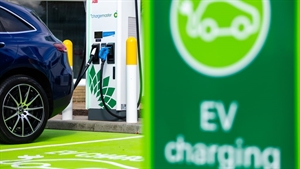BP gives details of major strategy shift while oil firms slash remaining asset values
Sat 15 August 2020
View all news

BP has announced details of a new strategy that it says will reshape its business from being an international oil company focused on producing resources to an integrated energy company specialising in delivering solutions for customers. In related news, BP and six other top oil companies have downgraded their asset valuations by $87bn since the end of 2019.
BP's plan includes a commitment to increase annual low carbon investment 10-fold to around $5 billion a year. The announcement follows an earlier commitment by the company to sharply cut net carbon emissions by 2050 or sooner.
BP says the increased investment will allow it to build an integrated portfolio of low carbon technologies, including renewables, bioenergy and early positions in hydrogen and CCUS.
As part of its strategy, BP says it aims to increase its electric vehicle recharging points from 7,500 to 70,000.
By 2030, the company aims to have developed around 50GW of net renewable generating capacity – a 20-fold increase from 2019 – and to have doubled its consumer interactions to 20 million a day.
Over the same period, bp’s oil and gas production is expected to reduce by at least one million barrels of oil equivalent a day, or 40%, from 2019 levels. It says that it expects its remaining hydrocarbon portfolio is expected to be more cost and carbon resilient.
The company has also set out a new financial frame "to support a fundamental shift in how it allocates capital, towards low carbon and other energy transition activities."
BP's Chairman, Helge Lund, said: “Energy markets are fundamentally changing, shifting towards low carbon, driven by societal expectations, technology and changes in consumer preferences. And in these transforming markets, bp can compete and create value, based on our skills, experience and relationships.”
CEO, Bernard Looney, said: “bp has been an international oil company for over a century - defined by two core commodities produced by two core businesses. Now we are pivoting to become an integrated energy company - from IOC to IEC. From a company driven by the production of resources to one that that’s focused on delivering energy solutions for customers.
“We believe our new strategy provides a comprehensive and coherent approach to turn our net zero ambition into action. This coming decade is critical for the world in the fight against climate change, and to drive the necessary change in global energy systems will require action from everyone.
BP says is will become a very different company as a result of delivering the strategy By 2030, BP aims for:
-
investment in low carbon energy to have increased from around $500 million to around $5 billion a year;
-
developed renewable generating capacity to have grown from 2.5GW in 2019 to around 50GW;
-
bioenergy production to have risen from 22,000 b/d to more than 100,000 b/d;
-
hydrogen business to have grown to have 10% share of core markets;
-
global customer interactions to have risen from 10 million to 20 million a day;
-
electric vehicle charging points to have increased from 7,500 to over 70,000; and
-
energy partnerships with 10-15 major cities around the world and three core industries.
Over the same time, upstream oil and gas production is expected to reduce from 2.6 million barrels of oil equivalent a day (mmboe/d) in 2019 to around 1.5mmboe/d; and refining throughput is expected to fall from 1.7 million barrels a day (mmb/d) in 2019 to around 1.2mmb/d.
In related news, BP, Shell and others amongst the world’s largest listed oil companies have wiped nearly $90bn from the value of their oil and gas assets in the last nine months, Carbon Tracker analysis shows.
The analysis suggests that the coronavirus pandemic may be accelerating the global shift away from fossil fuels.
The climate finance thinktank Carbon Tracker shows that in the last three month alone, Shell, BP, Total, Chevron, Repsol, Eni and Equinor have reported downgrades on the value of their assets totalling almost $55bn.
The Guardian reports that oil companies have cut their projections for oil prices. Over the last year, BP has cut its forecasts by almost a third, to an average of $55 a barrel between 2020 and 2050. Shell has cut its forecasts from $60 a barrel to an average of $35 a barrel this year, rising to $40 next year, $50 in 2022 and $60 from 2023.
Related Links
< Back to news list